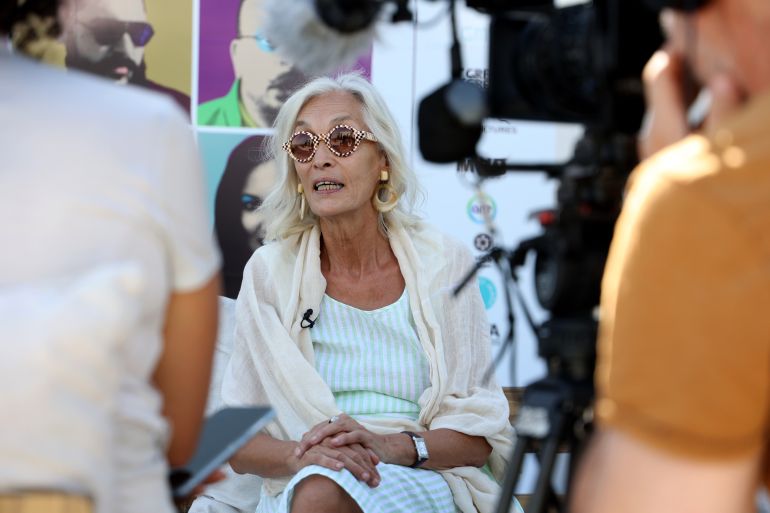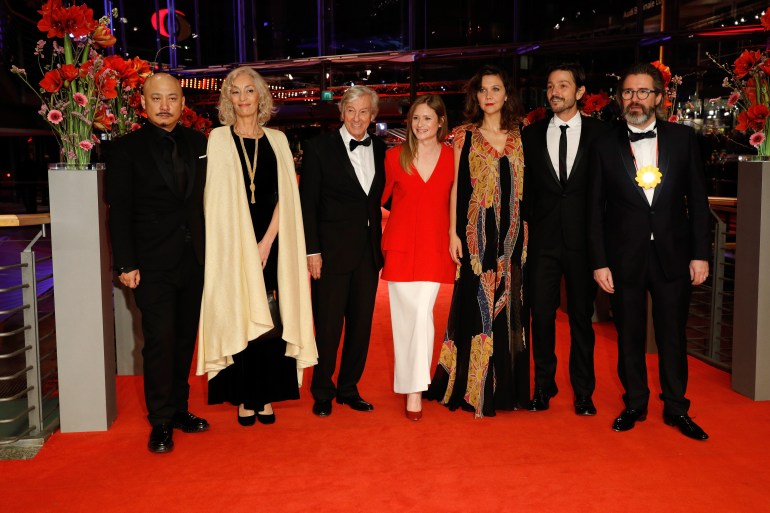Tunisian film producer Dora Bouchoucha: ‘Free speech is threatened’
One of the most respected figures in Tunisian cinema discusses her journey with Al Jazeera.

When she speaks in English, Dora Bouchoucha’s lilting voice still holds traces of her time in the United Kingdom.
Leaning towards her camera, she says: “I need to be touched. I like films that reveal the hidden part of a character.”
Keep reading
list of 4 itemsNapoleon hat fetches record $2.1m at Paris auction
Ten films to watch about the history of the Israel-Palestine conflict
Five films that tell the human stories behind the Israel-Palestine conflict
The Tunisian film producer is one of the most innovative and respected figures in Tunisian cinema and has mentored many young directors to find their path and message.
“I like plots that delve into how humans are perceived. We live in a culture where, as long as things are hidden behind a door, everything is fine.”
Her approach and keen eye for talent have resulted in the stellar success of Tunisian directors like Raja Amari and Mohamed Ben Attia, who have seen their films selected for international festivals around the world.
Bouchoucha spoke to Al Jazeera via video conference after one of her workshops for Ateliers Sud Écriture, which fosters emerging Arab and African filmmakers. Relaxed and expressive, she was happy to talk.
For her, film production came relatively late, long after her first love, literature, and it was a chance conversation with Tunisian director Moufida Tlatli in the mid-1990s that led to her first experience on a film set.
“Moufida shared with me the script of Les silences du palais [The Silences of the Palace, 1994]. After we discussed it, Moufida asked me to join the crew on set,” Bouchoucha explains.
Les silences du palais was the first feature film by a female director from the Arab world to find international success.
On set, Bouchoucha worked with one of Tunisia’s most celebrated producers, Ahmed Baha Eddine Attia, who introduced her to much of the profession.
During the course of the conversation, she described the way she has used her career to engage and inspire new generations of filmmakers.
Bouchoucha was born in 1957 in Manouba, near Tunis. Her father was the director of a hospital, and her mother ran an orphanage.
After a challenging education at the predominantly male Collège Sadiki in Tunis, she moved to the UK.
“After my secondary schooling, I went to England to study English,” she says to me. But “I’ve always wanted to come back to my homeland. So I finished my higher education in English literature at the University of Tunis.”

Unearthing talents
Following the success of The Silences of the Palace, Bouchoucha co-founded Nomadis Images, with the director Ibrahim Letaïef in 1995.
Through this production company, located to the north of Tunisia’s capital in La Marsa, she has realised numerous local and international feature-length, short and documentary films, as well as having helped unearth countless talented filmmakers.
Discounting the trends and fads of much of modern cinema, Bouchoucha draws inspiration from current issues, such as memory, political violence and self-liberation.
Her first productions with Nomadis Images were Raja Amari’s short films, April (1998) and One Evening in July (2000).
Afterwards, she continued to produce and co-produce Amari’s work, including the acclaimed Red Satin (2002), which tells the story of a widowed Tunisian housewife who takes up belly dancing as a form of liberation for the female body.
However, despite being a relatively lone female voice, Bouchoucha rejects the idea that she may have been the victim of discrimination.
“Looking back, I didn’t have the impression that I had to fight battles. I mingled a lot. I wouldn’t say that it was difficult to be a producer because I was a woman,” she recalls.
What discrimination she did encounter, such as being labelled, along with Amari, the “scandalous women of Tunisia” when Red Satin was released is remembered with wry amusement rather than resentment.
In addition to her own work, Bouchoucha has also worked alongside Tunisian director Mohamed Ben Attia’s transition from short fiction films to feature film, co-producing Hedi, a Wind of Freedom (2016) with the Dardenne brothers’ production company, Les Films du Fleuve.
Hedi, a Wind of Freedom, went on to win the Best First Feature Award and the Silver Bear for Best Actor at the 66th Berlin International Film Festival.
Along with Amari, Bouchoucha has continued to work with Ben Attia, producing his subsequent films, Dear Son (2018) and the recently added Behind the Mountains (2023), the story of a man breaking free from his banal environment and dismissing society’s banal principles, codes and institutions.
Festivals, juries and collaborations
In 1997, Bouchoucha founded Sud Écriture, a small association which mentors emerging African and Arab filmmakers, together with her Nomadis Images colleague Lina Chaabane and the now-retired Annie Djamal.
As the industry grows and gains more international appreciation, record numbers of African films have had their premieres in international film festivals, such as this year in Cannes.
“In 26 years of activity, the Sud Écriture workshops have trained more than 200 emerging filmmakers from the African Continent and the Arab World,” Bouchoucha says.
Asmae El Moudir, director of The Mother of All Lies (2023), which is Morocco’s entry for the Best International Film at the 96th Academy Awards, attended the workshop series. The hybrid documentary directed, written and co-produced by Asmae El Moudir is inspired by bread riots in El Moudir’s home city of Casablanca in 1981, and world premiered at Cannes this year.
Since 2011, Sud Écriture has also regularly organised a workshop for six national projects, with the support of the French Institute of Tunisia and the Tunisian Ministry of Culture.
“Aside from our Sud Ecriture workshops, I contribute to the Doha Producers Lab, to Ouaga Film Lab, In Burkina Faso and Up Courts in Senegal. This is important for me as I witness the cinema of the continent and the MENA region,” she said, “I noticed how the narrative has evolved, how the stories are strong and diverse. When we look up at the last Cannes lineup, we are happy to say that most of them had been developed in these labs.”
Plaudits for Bouchoucha’s contribution to film have come from as far afield as El Gouna and Luxor film festivals in Egypt and MedFilm in Rome.
Ginella Vocca, founder and artistic director of the MedFilm Festival in Rome had no hesitation in rendering her verdict on Bouchoucha’s contribution to cinema. “For years, Dora Bouchoucha has tirelessly supported and launched outstanding filmmakers,” she said by phone.
Calling the Tunisian producer “a colleague but also a friend”, Vocca continued, describing how Bouchoucha was distinguished by “the absolute dedication she reserves to the projects she works on”.
In addition to producing films, Bouchoucha led the Carthage Film Festival as general director in 2008, 2010 and 2014. She has also served as a jury member at the 67th Berlin International Film Festival in 2017 and for the Luigi De Laurentiis Award for a Debut Film at the 77th Venice International Film Festival in 2020.
In 2018, Bouchoucha was elected to join the Academy of Motion Picture Arts and Sciences, which runs the annual Oscars Awards, along with 11 other Arab filmmakers.
However, suggestions that the space for free speech is shrinking within Tunisia are dismissed: “Nowadays free speech is threatened in the entire world,” she said, pointing to the relative silencing of prominent Muslim voices in the US.
“So I can say that free speech in Tunisia is not doing [too] badly.”